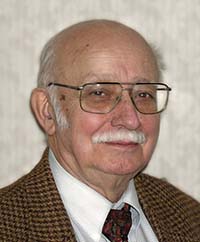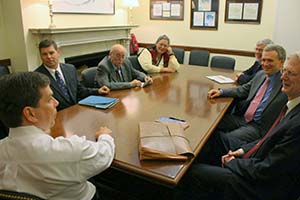
Walt Parker, 10 year council board representative for the Oil Spill Region Environmental Coalition, seems to have made a contribution to just about everything Alaskan over the years. He’s had a hand in urban planning, education, transportation, fisheries, telecommunications, and land use planning, and the oversight of oil and gas operations all over Alaska and the Arctic.
Much of the major federal legislation involving Alaska, including the Alaska Native Claims Settlement Act of 1971, the Trans-Alaska Pipeline Authorization Act of 1973, the National Fishery Conservation and Management Act of 1976, known as the Magnuson-Stevens Act, the Alaska National Interest Lands and Conservation Act of 1980, and the Oil Pollution Act of 1990 has Parker’s fingerprints on it.
Shortly after his service in World War II, Parker married his wife Patricia and brought her to Alaska in 1946. From 1946-1970, he worked for the Federal Aviation Administration, the Federal Field Committee for Development Planning in Alaska, and headed the team that reported to Congress on which pipeline route from Prudhoe Bay best served national interests.
After leaving federal service in 1971, he joined the University of Alaska, working on international fisheries and transportation and teaching courses in political science, urban planning and regional planning. He and Patricia founded Parker and Associates, Inc. which consulted primarily on transportation and telecommunications issues.
In 1974, Parker was appointed as environmental consultant to the state on the pipeline and served as director of the technical staff. He oversaw the construction of the Dalton Highway.
Governor Hammond asked him to join his cabinet as commissioner of highways to form a Department of Transportation, served as chair of the Alaska Oil Tanker Task Force, as delegate from Alaska on the Pacific Oil and Ports Group, and chaired the Alaska Telecommunications Task Force.
After the Exxon Valdez oil spill, Governor Cowper appointed Parker as chair of the Alaska Oil Spill Commission, the group charged with examining the causes of the Exxon Valdez oil spill. The commission made 52 recommendations for improvements. Congress incorporated 50 of these recommendations into the Oil Pollution Act of 1990.
One of these recommendations was to create a citizen oversight council for the oil industry in Prince William Sound.
He later chaired the Alaska Hazardous Substance Spill Technology Review Council from 1990 to 1995, which examined oil spills and other hazardous substance problems in Alaska.
In 1995, he was appointed by President Clinton as a Commissioner of the Arctic Research Commission, and later served as a delegate from the U.S. to the Arctic Council. He was appointed to the U.S. delegation to the Arctic Environmental Protection Strategy Working Group on Emergency Preparation, Prevention and Response in 1995.

Over the years, Parker served on many other committees, boards, and other organizations, including president of the Anchorage Chapter of the Alaska Conservation Society, the Alaska Forum for Environmental Responsibility, chaired the Bering Sea Forum, a joint U.S./Russian group formed to protect North Pacific Ecosystems. He chaired the Circumpolar Infrastructure Task Force; and served as the international infrastructure and emergency response liaison for the Northern Forum, which provides oversight on oil and gas development in the Russian North. Parker was a senior fellow at the Institute of the North at Alaska Pacific University. He also served on the boards of the Prince William Sound Science Center, the Oil Spill Recovery Institute, and the North Pacific Research Board.
Parker remembered
Parker passed away at home, surrounded by his family, on June 25, 2014. He is remembered with fondness and respect by the council’s staff and volunteers.
“The council was fortunate to have had Walt as a member, and I was fortunate to have been his friend,” said Linda Robinson, former outreach coordinator for the council and current member of the Information and Education Committee, “His energy and focus was amazing, and he generously shared his knowledge and experience.”
“In times of frustration at the slow pace of progress, I found his tenacity and perseverance inspiring,” said Steve Lewis, board representative for the City of Seldovia. “I hope and intend that I can carry on in his model.”
“Having a resident historian in-house was a rare and unique opportunity,” said Patience Andersen Faulkner, board representative from Cordova District Fishermen United, “During board meetings Walt would bring Prince William Sound issues to the state, national and world level. After a board meeting, Walt would be at the watering hole, holding audience to mostly ladies of all ages, keeping us enthralled with stories of his many travels. He could tell a story with a great sense of humor and a twinkle in his eye. At board meetings, Walt brought the back story as to how we as a people arrived at this shore. Walt was a walking historian. My experiences with Walt were rich but too few.”
”Walt served as president of the council shortly after I was hired in 2010,” said Mark Swanson, executive director of the council. “I had the privilege of traveling with Walt to meet with numerous executives and leaders around the state and in our nation’s capital. Walt’s stewardship credentials and contributions to Alaska and the nation are legendary. We will all miss this giant of a man.”